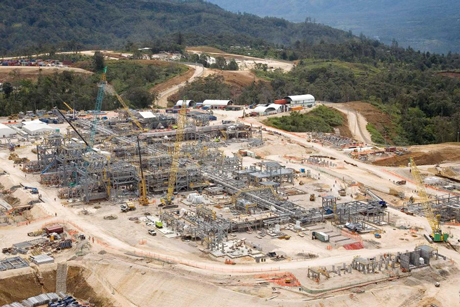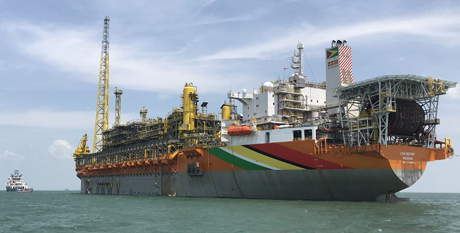
New Guinea
occurring in Guyana

By Kemol King
(Kaieteur News) – ExxonMobil has led a consortium since 2014, embarking on a Liquefied Natural Gas (LNG) Project in the highlands of Papua New Guinea (PNG). The project was said to be transformative, with projections being made that it would revolutionise several aspects of the Papua New Guineans’ lives.
The Jubilee report is titled – Double or Nothing: The Broken Economic Promises of PNG LNG.
Former Australia senator and columnist for The Guardian, Scott Ludlam, who wrote on the project, said that it “provides a distressing case study of large-scale economic parasitism.”
How did a project meant to transform the lives of Papua New Guineans end up making the country weaker in several areas? Jubilee Australia has listed several reasons. Kaieteur News has observed that the shortfalls named are reflected in developments occurring right here in Guyana, since oil was discovered by ExxonMobil in 2015 in the Stabroek Block.
Secret Agreement
One of the more striking similarities is the secrecy of the agreement. The report mentioning the secrecy was published in 2018, which means the people of Papua New Guinea have had to endure a project for which they were ignorant of the detailed fiscal agreement for at least four years.
In Guyana, while the Production Sharing Agreement (PSA) with ExxonMobil was eventually released, it was only done so after sustained calls for its release and protests against a lack of transparency in Guyana’s Petroleum sector.
Late last year, local activist Ramon Gaskin criticised the secrecy surrounding agreements and contracts.
“The [first agreement], I think, [was released] 17 years from 1999, and the Trotman agreement after a lot of agitation, it was eventually released,” Gaskin said.
That refers to the original 1999 Petroleum Prospecting Licence for the Stabroek Block. It was signed by the late Janet Jagan, in her capacity as Minister of Petroleum.
That was just the beginning. The Production Sharing Agreement (PSA) currently in force was signed by Trotman in 2016. It was published in December 2017, a year after it was inked.
“But not all of it [was released]” Gaskin had said, referring to the annexes of the contract that still have not been published.
Also hidden from the public for a period was the US$18M signing bonus that Government collected when it signed the 2016 agreement. Now, three years after the signing of the 2016 contract, all agreements have not been made public.
Guyana awaits the release of the bridging deed adjoining the 1999 and 2016 agreements.
Local commentators have said that, by not releasing the bridging deed, Trotman is still in contravention of the Petroleum Act, which requires the Minister to publish notice of the agreement in The Official Gazette as soon as is practicable after the licence is granted. By failing to observe this aspect of the law, Trotman is said to have set a worrying precedent.

Generous Tax Concessions
The Jubilee report on Exxon’s gas project in Papua New Guinea noted that the small revenues being paid to the government is partly due to the exceedingly generous tax concessions granted to the Asia-Pacific country’s Petroleum sector. It is described in the report as “disappointing”.
Although detailed commercial agreements between the Government and the PNG LNG joint venturers is shrouded in secrecy, the research body was able to conclude based on analysis of limited public disclosures that very generous fiscal terms were offered as part of securing the deal.
It stated that the companies were able to negotiate for tax concessions because it was wooed into expecting massive revenues. That turned out to be less than truthful for the government.
The report pointed out a statement by the country’s 2017 Treasuer, Charles Abel, that the country needs to develop a mineral and petroleum regime that gets more for the people, including a higher royalty rate and strengthened local content.
Despite warnings from the International Monetary Fund (IMF), the World Bank and the Asian Development Bank (ADB), taxes were cut for the sector even more in the 2017 budget, Jubilee Australia noted.
In Guyana’s case, the operators of the Stabroek Block have been exempted from a series of taxes, which Guyana will be paying for them.
Canada based Engineer, Darshanand Khusial has said that it will cost the people dearly.
“Guyana is helping the rich foreign shareholders get richer while its poor sleep on planks with cardboard sheets,” Khusial had said in a letter to Kaieteur News.
If they were required to pay taxes at the commercial rate, Khusial pointed out in October that the reserves could secure Guyana almost US$35B for the Guyanese people, based on his analysis of the value of the reserves at the time. ExxonMobil has since made more discoveries.
Guyana isn’t just granting ExxonMobil tax concessions. It is also going to give out tax certificates so that oil companies could also be exempted from paying taxes in their home countries.
Use of Shell Companies and Subsidiaries
Jubilee Australia pointed out that the companies have used subsidiaries and shell companies as conduits to increase their revenue share by avoiding paying taxes.
Khusial cautioned Guyana about Exxon’s use of its local subsidiary to recover more on its investments. He had explained that Esso Exploration and Production Guyana Limited (EEPGL)’s negative equity would allow ExxonMobil to recover more than it invested due to high interest rates on loans handed out from the parent company.
The Stabroek PSA allows ExxonMobil to recover the interest on loans, with no cap on how much interest can be recovered.
Khusial estimated that the faultiness of the contract could cost Guyana billions of United States dollars.
Furthermore, this issue applies not only to the Stabroek Block operations, but the Orinduik Block as well.
University of Houston Instructor Tom Mitro described this arrangement as an abusive use of debt, since Guyana is essentially standing all the costs.
After holding several rounds of discussions following reports by Kaieteur News on this “abusive” arrangement, the government decided last year to change its approach to the treatment of interests under Production Sharing Agreements (PSAs). In fact, a government document seen by this newspaper specifically states that, “interests would no longer be a recoverable/deductible expense” by oil companies.
While this move would save government revenues in future deals, Exxon’s operations on the Stabroek Block will still be allowed to move forward with interests being recovered.
Optimistic Expectations
The overt excitement of the Papua New Guinea people and Government alone does not explain why the results of the country’s gas project fell below expectations. The report stated that it was compounded by a series of policy decisions that resulted in damaged growth – decisions which were directly related to the expectations from the project. These poor decisions reflect the resource curse, the report noted. Time was spent attempting to build on the expected growth of the country from the project, instead of working to provide transparent, verifiable economic models to start on a path to maximize government revenues.
In Guyana’s case, the dream of Guyana becoming a Caribbean Dubai continues to be sold to the people by some public officials and sections of the public, despite the following.
Since the release of the Stabroek PSA, Kaieteur News has reported on a series of loopholes that hamper the country’s ability to secure the maximum benefit for the people, and provisions described as lopsided and unfair to Guyana. Government and Opposition do not appear willing to renegotiate. Furthermore, the provisions in the contract have tied the government’s hands behind its back, so much that any attempt to mount a legal challenge would be detrimental to Guyana.
In its article IV consultation of 2018, the IMF projected that Guyana would take home an average of about US$421M per year in the first few years of oil production in the Stabroek Block. By the time it completed its projection for the following year, that projection had been revised by US$98M less, each year. This was pointed out by the Inter American Development Bank (IDB) in its Caribbean Region Quarterly Bulletin for the final quarter of 2019.
EXXON’S “Parasitic” PNG Gas Project
The people of Papua New Guinea were led to expect much more than they got. The results pointed out in the report are daunting.
“Despite predictions of a doubling in the size of the economy, the outcome was a gain of only 10 percent and all of this focused on the largely foreign-owned resource sector itself.”
“Despite predictions of an 84 percent increase in household incomes, the outcome was a fall of six percent.”
“Despite predictions of a 42 percent increase in employment, the outcome was a fall of 27 percent.”
“Despite predictions of an 85 percent increase in Government expenditure to support better education, health, law and order, and infrastructure, the outcome was a fall of 32 percent.”
“Despite predictions of a 58 percent increase in imports, the outcome was a fall of 73 percent.”
Furthermore, it is stated that the project has had a negative impact on the country’s budget. Jubilee Australia projected that for the entire 30 year life of the project, the Government is likely to get way less than was projected initially under a low gas price scenario.


